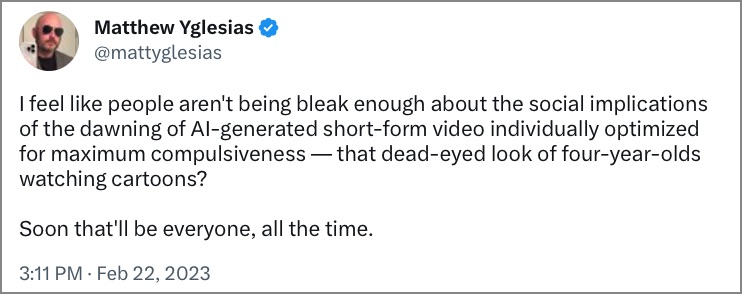Where are the customers’ chats?
By Mark Hurst • February 24, 2023
The 1940 book “Where Are the Customers’ Yachts?” by Fred Schwed, a classic work about investing, starts with an anecdote. A first-time visitor to Manhattan is being shown around Wall Street:
When the party arrived at the Battery, one of his guides indicated some handsome ships riding at anchor. He said, “Look, those are the bankers’ and brokers’ yachts.”
“Where are the customers’ yachts?” asked the naive visitor.
I’ve been thinking about that anecdote recently while observing the froth about ChatGPT and other AI generators. My two recent columns describe my reaction: that AI generators are turning the internet into glop (see AI is creating the Play-Doh internet) while being portrayed, falsely, as sentient beings with personalities (see Sassy AIs are not the problem). But there’s another aspect of the media coverage worth noting, and that’s what hasn’t happened.
In all of the ChatGPT coverage, I haven’t seen why this is a good idea for customers: I mean the users, patients, students, citizens, consumers, and all others who are on the receiving end of this technology. We’ve heard about all of the handsome profits available to the Big Tech giants, and AI startups, for adopting and promoting AI chat technology. But that leaves an obvious question. If you’ll excuse a bit of wordplay, I’d like to ask: Where are the customers’ chats?
I’m serious. Everything in the hype around ChatGPT seems to center on what this means for corporations: “think of the margins, no more need to pay for researchers, writers, or editors!” Or, for articles taking the flip side: “time to freak out if you’re a researcher, writer, or editor!” All of which may be valid, but the discussion is limited to how the tools will change life inside the corporation (fatter bonuses for execs, more pink slips for employees). No one mentions the customers.
Get Mark Hurst’s weekly writings in email: Subscribe. (Or join the CG Forum.)
Sign up for this newsletter.
When evaluating a new technology, it’s a dangerous oversight to forget customers (i.e., users, patients, students, etc.). Yet it happens. It’s typical of the tech industry to launch tools, products, whole platforms without a thought toward the user: my book Customers Included (2nd edition) offers plenty of examples. But the problem has grown worse in recent years as Big Data, algorithms, and now AI generators have captured the imagination of Silicon Valley. The Platonic ideal of digital tech these days is a predictable, controllable, fully automated system in which customers are, at best, a detail to be slotted in and manipulated for the benefit of the growth of the machine.
And that brings us to ChatGPT and other AI generators. We hear all about what the tool can do (write an essay, a limerick, some song lyrics), but not much about the reasons customers might want to use a chat tool. It’s the why that’s missing.
I know, I know, “customers don’t know what they want.” And “if we asked customers wanted they wanted, they’d say a faster horse.” I’ve heard it all (and I wrote about it in the book). My response, though, is that even with the most out-of-the-box new innovations, customers were pretty clear on the benefits early on. For example, the iPhone – totally disruptive of Nokia phones, blah blah blah – it took users about a minute to realize that it solved some urgent pain points (better address book, better voice mail, and so on). I just don’t see this happening, yet, with ChatGPT.
Let’s set aside the stories bemoaning the ability of high school students to auto-generate their essay on “The Great Gatsby.” Those stories are usually a prelude to a pitch for yet more technology – watermarks allowing detection of ChatGPT glop – or, worse, more surveillance of students. All of which leads right back to enriching the Silicon Valley robbers.
Instead, I mean: where is the good experience in ChatGPT? Along the three dimensions of good experience – utility, meaning, and fun – where is ChatGPT serving some greater good? Where is the joy of discovery, the relief of a pain removed, the emotion from an authentic connection? Once we get past the parlor tricks of limericks and song lyrics, what remains – for us, the users? I haven’t heard about it from anyone I’ve spoken to, and I certainly haven’t seen it covered in the press.
Get Mark Hurst’s weekly writings in email: Subscribe. (Or join the CG Forum.)
Sign up for this newsletter.
This is a problem. Microsoft just invested $10 billion in this idea to bolt it onto its Bing search engine. And Google is obsessed with playing catch-up to add AI to its search. Neither company seems to be investing in what users really want in a search engine, which is a simple, useful tool that doesn’t steal their data or self-preference its own products. Google is too committed to surveilling and exploiting users on its pay-to-play wasteland of a search engine to make those improvements. So it turns to AI chat.
I know that AI generated tools are good for the owners and investors of major tech corporations. AI chat is going to make them a lot of money, and they’ll enjoy buying “handsome ships riding at anchor” with their winnings. What I want to know is, where are the customers’ chats?

Until next time,
-mark
Mark Hurst, founder, Creative Good – see official announcement and join as a member
Email: mark@creativegood.com
Read my non-toxic tech reviews at Good Reports
Listen to my podcast/radio show: techtonic.fm
Subscribe to my email newsletter
Sign up for my to-do list with privacy built in, Good Todo
On Mastodon: @markhurst@mastodon.social
- – -